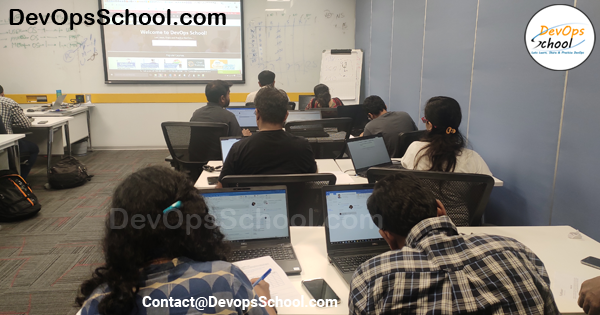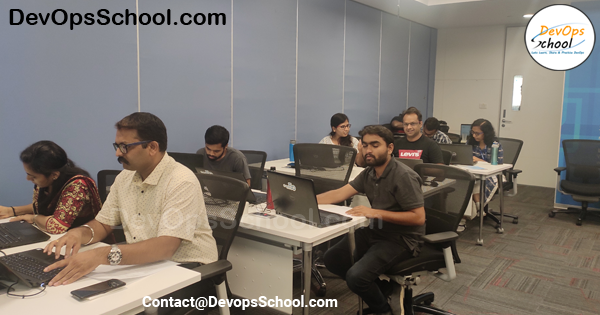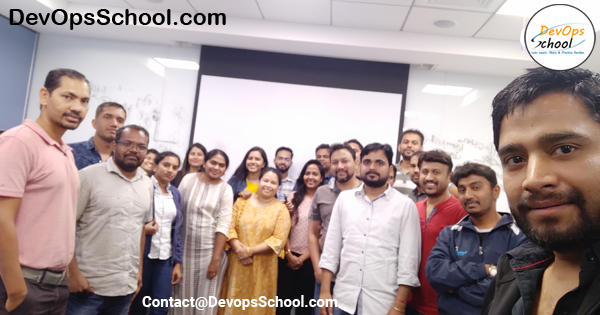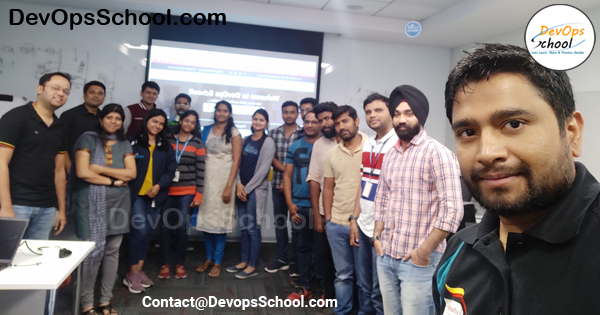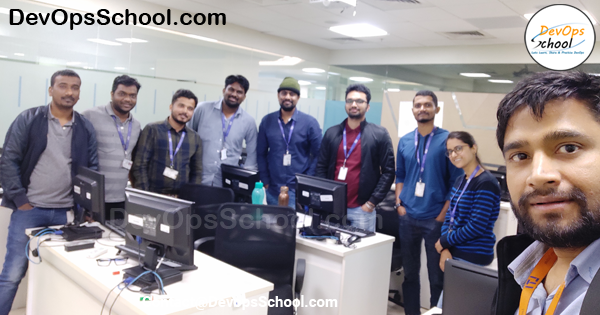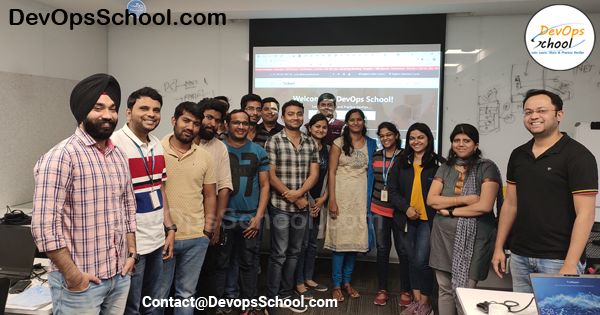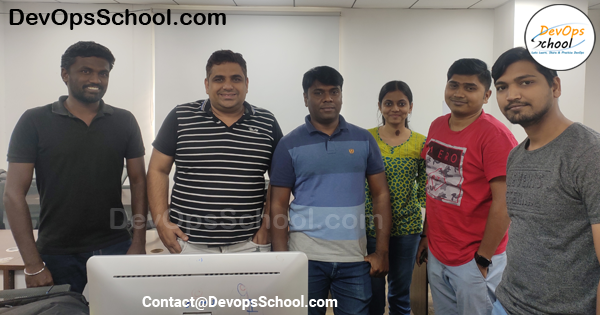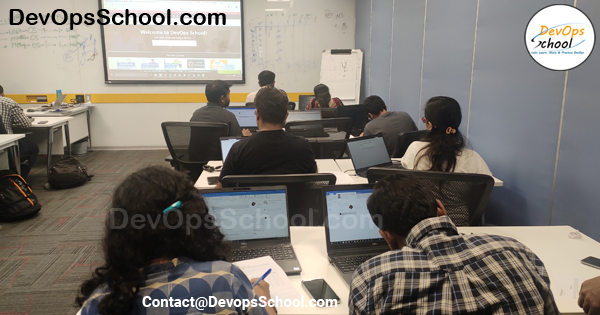1. About This Course and Certification
The AppDynamics Training and Certification by AI Universe, in collaboration with DevOpsSchool.com, is designed to provide comprehensive knowledge and hands-on experience with AppDynamics, one of the leading Application Performance Management (APM) tools. This course equips participants with the skills required to monitor, troubleshoot, and optimize the performance of enterprise applications in real time. The certification validates your expertise in AppDynamics, making you industry-ready and recognized by global enterprises for APM proficiency.
2. What is AppDynamics?
AppDynamics is a leading Application Performance Management (APM) solution that enables real-time monitoring and management of applications across complex cloud and on-premises environments. It helps businesses gain deep insights into performance metrics, troubleshoot bottlenecks, and ensure optimal user experience. AppDynamics works by collecting data from various touchpoints within an application and provides analytics to improve system performance, resource utilization, and overall business performance.
3. Why AppDynamics is Important?
In today’s digital-first business world, application performance directly impacts user experience and business outcomes. AppDynamics is vital because it offers a comprehensive view of your application’s health, from code-level diagnostics to business transaction monitoring. By learning AppDynamics, IT professionals can preemptively detect performance issues, reduce downtime, and increase operational efficiency, which are critical to maintaining competitive business operations. Additionally, AppDynamics enables automation of responses to potential issues, making it a cornerstone of any DevOps or IT operations toolkit.
4. Course Features
- Instructor-led Training: Delivered by industry expert Rajesh Kumar, offering practical insights.
- Hands-On Labs: Real-world scenarios with AppDynamics setup and troubleshooting.
- Flexible Learning Schedule: 5-day intensive training with online or offline options.
- Certification Preparation: Comprehensive resources and mock tests to ensure participants are prepared for AppDynamics certification exams.
- Post-Training Support: Access to online resources, community forums, and mentorship for continued learning.
- Lifetime Access: Recordings of the sessions and course materials for lifetime reference.
5. Training Objectives
The objective of this training program is to:
- Equip participants with a deep understanding of the core concepts of Application Performance Monitoring using AppDynamics.
- Teach how to set up and configure AppDynamics for real-time monitoring of applications.
- Enable participants to identify, troubleshoot, and resolve performance issues within complex environments.
- Ensure that participants can optimize application performance for business outcomes.
- Prepare participants for the AppDynamics certification exams.
6. Target Audience
This course is ideal for:
- Application Developers and Engineers looking to integrate performance monitoring in the development lifecycle.
- DevOps Engineers aiming to monitor and optimize CI/CD pipelines.
- System Administrators responsible for application health and troubleshooting.
- IT Operations Professionals who manage enterprise-level applications and infrastructure.
- Solution Architects who want to design performance-optimized solutions.
- Beginners to Intermediate-level IT professionals who want to gain proficiency in APM tools.
7. Training Methodology
This course uses a combination of:
- Lectures: Delivered by Rajesh Kumar, covering key AppDynamics topics.
- Workshops: Practical, hands-on labs focused on installing, configuring, and monitoring applications using AppDynamics.
- Real-World Scenarios: Use cases from various industries, troubleshooting live issues, and resolving performance bottlenecks.
- Q&A Sessions: Interactive discussions to clarify concepts and dive deep into specific topics.
8. Training Materials
Participants will receive:
- Comprehensive slide decks and handouts.
- Lab manuals for hands-on exercises.
- Access to video tutorials and recorded sessions.
- Sample projects and assignments.
- Practice questions for the certification exam.
9. Evaluation
To evaluate the effectiveness of the training, participants will:
- Take part in pre-training assessments to gauge their baseline knowledge.
- Complete post-training tests to measure learning progress.
- Participate in mock certification exams to prepare for the official AppDynamics certification.
- Provide feedback through post-training surveys to continuously improve the course.
10. Continuing Education
After completing the course, participants can further enhance their knowledge with:
- Online resources such as webinars, blogs, and AppDynamics documentation.
- Access to DevOpsSchool.com community forums where industry experts share tips and best practices.
- Advanced courses on DevOps tools, cloud technologies, and monitoring solutions.
- Webinars and workshops on advanced AppDynamics features and integrations.
11. Certifications Program
After completing the training, participants can pursue the following certifications:
- AppDynamics Associate Performance Analyst.
- AppDynamics Professional Performance Analyst.
- AppDynamics Developer Certifications.
These certifications are recognized globally and open up career opportunities in performance monitoring, DevOps, and application engineering.
12. Level of the Training
This training is designed to cover:
- Fundamental Concepts: Basic introduction to AppDynamics for beginners.
- Intermediate Skills: Hands-on experience with setting up and configuring AppDynamics.
- Advanced Techniques: Troubleshooting, automation, and optimization for complex environments.
13. Agenda (Day-wise for 5 Days)
- Day 1: Introduction to AppDynamics, Architecture, Installation, and Configuration.
- Day 2: Monitoring Applications, Setting up Business Transactions, and Health Rules.
- Day 3: Deep Dive into Database Monitoring, End-User Monitoring, and Analytics.
- Day 4: Advanced Troubleshooting, Automation with AppDynamics, and Integrations with DevOps tools.
- Day 5: Certification Preparation, Practice Labs, and Mock Exam.
14. Lab Setup
Participants need the following setup for hands-on labs:
- A machine with at least 8GB RAM.
- Virtual Machines for simulating a distributed environment.
- AppDynamics Controller: Set up on a VM or cloud environment.
- Sample Applications: Provided by the instructor to simulate real-world scenarios.
- Internet connection for connecting to AppDynamics services and tools.
15. Trainers
The lead trainer for this course is Rajesh Kumar, an experienced DevOps consultant and trainer with over 15 years of experience in the industry. Rajesh has trained professionals worldwide and is recognized for his practical and hands-on teaching methodology. More information about him can be found at Rajesh Kumar’s Profile.
16. FAQ
- What is AppDynamics used for? AppDynamics is used for monitoring the performance of applications in real-time and ensuring their optimal functioning.
- Who is this course for? This course is for developers, system administrators, DevOps engineers, and IT operations professionals.
- Is prior knowledge required? Basic understanding of IT operations and application architecture is recommended but not mandatory.
- Do I need to install AppDynamics for the course? Yes, you will need access to an AppDynamics environment, which will be covered in the lab setup.
- Will there be hands-on labs? Yes, the course includes extensive hands-on labs to give real-world experience.
- How long is the certification valid? AppDynamics certifications are valid for two years, after which recertification may be required.
- What is the cost of certification? Certification exam costs vary but are generally around $200 per exam attempt.
- Can I attend this course remotely? Yes, both online and offline options are available.
- Are recordings provided? Yes, lifetime access to session recordings will be provided.
- What happens if I miss a session? You can catch up by watching the recorded session, and additional support will be provided by the instructor.
Certification
- Certification always plays vital role as it leads you towards a dedicated knowledge and skillsets.
- It provides you the ability to stand out of others.
- It gives you an edge during an interview by impressing the interviewer through your certification.
- DevOpsSchool helps you getting this certificate by making you worth to have it.
- DevOpsSchool gives you a completion certificate after successfully completion your training. it will be as a proof of your ability of knowledge and skills.
- The training will be given by industry recognized expert trainers who will make you an expert professional to hold this certificate.
- This certificate belongs to only DevOpsSchool, not to any other colleges, institute or company.
- Certification builds and boosts your confidence in dedicated skills that motivate you to work efficiently and effectively.
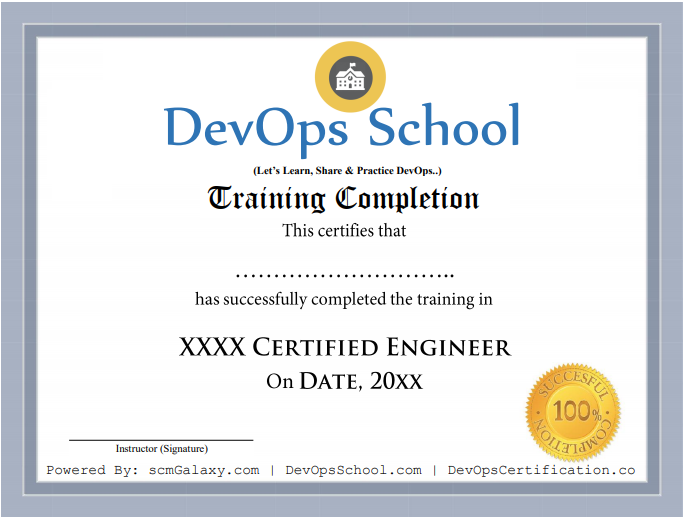
5 Days Detailed Training Agenda
Day 1: Introduction to AppDynamics and Basic Setup
- Introduction to Application Performance Monitoring (APM)
- Overview of APM concepts and their importance.
- Introduction to AppDynamics and its architecture.
- Setting Up AppDynamics Controller
- Controller installation (cloud or on-premise).
- Overview of AppDynamics UI.
- Accessing and configuring the AppDynamics Controller.
- App Agent Installation and Configuration
- Types of agents: Java, .NET, Node.js, etc.
- Installing the agent in a sample application.
- Configuring the agent for automatic discovery.
- First Application Monitoring Setup
- Defining application tiers and nodes.
- Monitoring the health of basic applications.
- Introduction to Business Transactions.
- Understanding Key Performance Indicators (KPIs)
- CPU, memory, response time, and throughput.
- Health rules for monitoring and alerting.
Day 2: Business Transactions and Application Diagnostics
- Introduction to Business Transactions
- Understanding business transactions in AppDynamics.
- Auto-discovery of transactions and manual configuration.
- Correlating performance data with business transactions.
- Monitoring Real-User Experience (RUM)
- Real-user monitoring overview.
- Setting up browser snapshots and session recordings.
- Synthetic user monitoring basics.
- Analyzing Transaction Snapshots
- Diagnosing slow or stalled transactions.
- Analyzing thread contention and code-level diagnostics.
- Capturing transaction snapshots manually.
- Advanced Error Detection and Handling
- Configuring custom exceptions for monitoring.
- Error thresholds and alerting based on error conditions.
- Custom handling for critical error scenarios.
- Health Rules, Policies, and Alerts
- Creating health rules based on performance metrics.
- Setting up custom alerts and notification policies.
- Automation using health rule triggers.
Day 3: Database Monitoring and End-User Experience
- Database Monitoring with AppDynamics
- Introduction to database agents.
- Installing the database agent and configuring database monitoring.
- Monitoring slow queries, response times, and resource usage.
- Query-level diagnostics and troubleshooting.
- Application Analytics and Business iQ
- Configuring AppDynamics Analytics.
- Capturing and analyzing business metrics.
- Correlating application performance with business performance metrics.
- Building business dashboards using Business iQ.
- End-User Monitoring (EUM)
- Setting up end-user monitoring.
- Configuring mobile RUM for Android and iOS applications.
- Tracking user interactions and monitoring end-user satisfaction.
- Custom Dashboards and Reporting
- Creating custom dashboards for executives, developers, and operations teams.
- Defining and scheduling reports.
- Best practices for dashboard creation.
Day 4: Infrastructure, Cloud Monitoring, and Automation
- Infrastructure Monitoring
- Setting up infrastructure visibility.
- Monitoring servers, hosts, and containers.
- CPU, memory, and disk utilization analysis.
- Cloud and Hybrid Environment Monitoring
- Monitoring cloud applications on AWS, Azure, and Google Cloud.
- Hybrid cloud architecture monitoring.
- Setting up AppDynamics for containerized environments (e.g., Kubernetes, Docker).
- Automating Application Performance Management
- Configuring auto-remediation using AppDynamics policies.
- Automation strategies: Auto-scaling, restart services, and alert suppression.
- Integrating AppDynamics with orchestration tools like Jenkins, Ansible, and Puppet.
- Integration with DevOps Toolchains
- CI/CD pipeline integration for proactive monitoring.
- AppDynamics integration with Git, Jenkins, and other DevOps tools.
- Monitoring in staging, production, and post-deployment phases.
Day 5: Troubleshooting, Optimization, and Certification Preparation
- Troubleshooting and Diagnostics Best Practices
- Common performance bottlenecks and their identification.
- Detailed troubleshooting workflows.
- Root cause analysis for performance and scalability issues.
- Performance Optimization Techniques
- Techniques for code-level optimization.
- Resource allocation and load balancing strategies.
- Fine-tuning AppDynamics configurations for better performance.
- Certification Preparation
- Overview of AppDynamics certification paths.
- Review of exam objectives and key topics.
- Hands-on mock exam and problem-solving session.
- Discussion of advanced topics covered in the certification exam.
- Project Work
- Final project: End-to-end AppDynamics setup for a sample enterprise application.
- Presenting and defending the project work.
- Closing discussion and next steps for continued learning.
Reviews
By having an excellent journey with 8000+ participants from different countries we have got excellent reviews that helps us stand out of other institutes and being proud. We proudly can say we have helped so many individuals and working professionals to build their career. Here are some of the reviews that we have got from our participants who are happy by being a part of DevOpsSchool.
Videos
Projects
During this training you will get a real-time based project to work on, which will help you to implement your learnings and also it will boost your knowledge and skills. With important tools and platforms you will have real-world experience where we help you to visualize a real development environment, testing environment and production environments.
FAQs
1. Will I get technical support after completion of training?
- Yes, Its free of cost for life time. We will give you can access of our Google drive where you can drop you query and our trainers will respond you back.
2. Why should I learn AppDynamics course online instead of offline?
- First this is the best option to keep you and your instructor safe in this dangerous pendamic. As well as the environment and benefits what you will get in offline classes same we will provide you in online classes. We will make your experience much better and comfortable than offline classes. That’s why we provide live and instructor-led online classes where you can interact your instructor to clear your doubts.
3. How long will it take to complete the course?
- It will take approx 14 Hrs to fully complete the course.
4. Will I get any placements after the training?
- Well we don’t provide any placements as of now but we can provide you a interview kit to help you out.
5. What are the pre-requisies to learn AppDynamics?
- Have basic mathematic knowledge
- Want to learn more about AppDynamics
6. Can a non technical person learn AppDynamics?
- Yes, but it will be very hard to learn because here the technical words and platforms will be used that he will be not aware of so in my recommendation you shouldn’t try but if still if you want to then yoou should be very concentrated and honest with you as you have to work hard.
7. Do you have online classes or offline classes?
- As of now online classes but he it is a group of people requirement then we can have discussion about offline classes.
8. Will I get the job after completing this course?
- Yes, you will be fully capable to perform any task given to you by your domain senior or manager. As you will be certified engineer who will have all the required skills and knowledge to perform any task.
9. Which kind of certification will DevOpsSchool provide?
- It’s a completion certificate. It will show that you have successfully completed the training and have the right skills and knowledge to perform the task assigned by your company.
10. How to start a AppDynamics career?
- You can go for self learning materials like Pdf, Slides, youtube videos but there are one more option that is our AppDynamics program. It’s our AppDynamics certifed program that will teach you from basic to make you able to understand and perform a AppDynamics engineer tasks.
11. Who will be my trainer?
- As we have so many trainers its not possible to tell you quickly, as we have to go through their availability. But we can assure you you will get a best trainer as we have a group of best trainers who are very experienced and skillful trainers. They have 15+ iT working experience.
12. Can I get a demo session?
No we don’t provide any demo class but instead of that we can provide you a class recordings so you can decide.
13. Do we have classroom training?
Yes, Classroom training is available in Bangalore, Hyderabad, Chennai and Delhi location. Apart from these cities classroom session can be possible if the number of participants are 6 plus in that specific city.
14. How will I execute the Practicals?
All the Demo/Hands-on are to be executed by our trainers on DevOpsSchool’s AWS cloud. We will provide you the step-wise guide to set up the LAB which will be used for doing the hands-on exercises, assignments, etc. Participants can practice by setting up the instances in AWS FREE tier account or they can use Virtual Machines (VMs) for practicals.
15. What if I miss any class?
In case if you miss the class then there are two ways to get to know what topics has been covered, i.e 1st- We will share the class recordings, notes etc to you and 2nd – you can attend any other session under 3 months of time period.
16. What is course fees?
- It’s Rs 24,999.
17. How is the virtual led online training takes place?
- We use GoToMeeting platform to organize our virtual sessions.
Our Gallery
